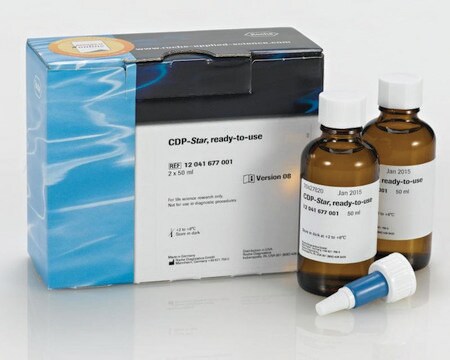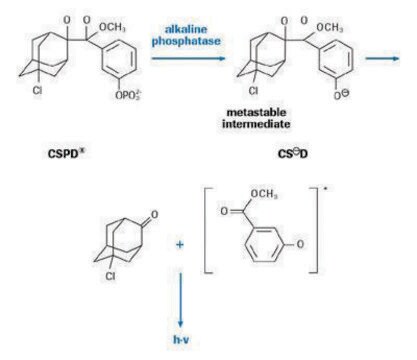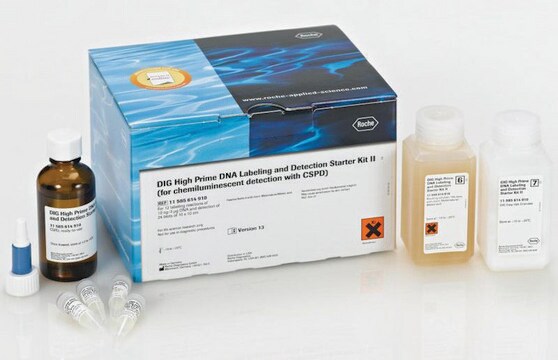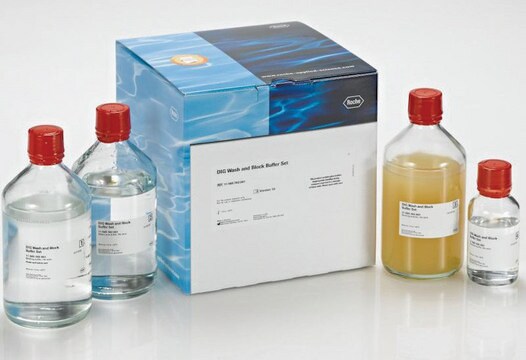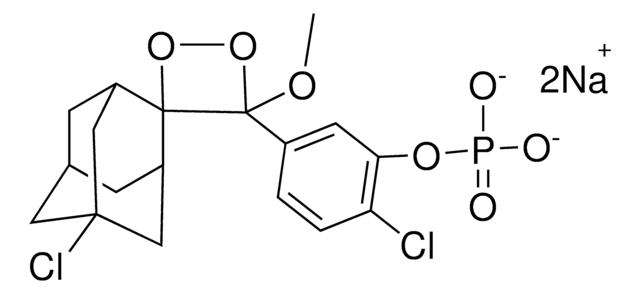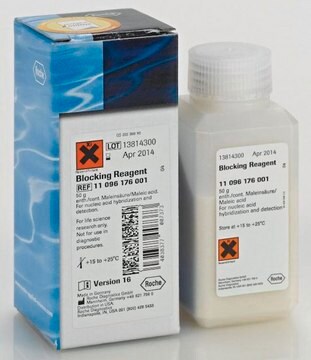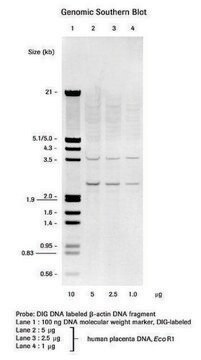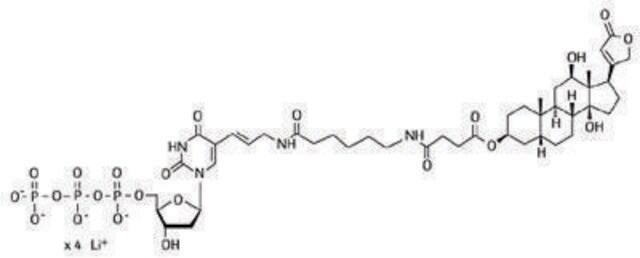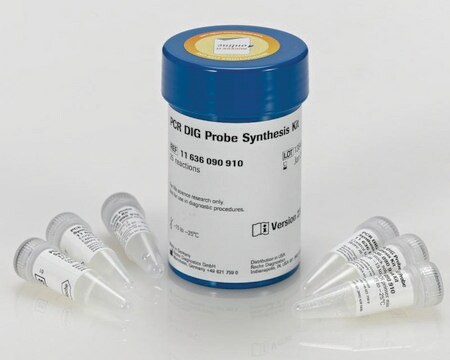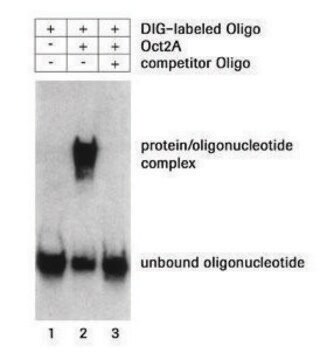CSPD-RO
Roche
CSPD ready-to-use
Disodium 3-(4-methoxyspiro {1,2-dioxetane-3,2′-(5′-chloro)tricyclo [3.3.1.13,7]decan}-4-yl)phenyl phosphate
Sinónimos:
ready-to-use, cspd
Iniciar sesiónpara Ver la Fijación de precios por contrato y de la organización
About This Item
UNSPSC Code:
41105500
Productos recomendados
Quality Level
assay
>98% (HPLC)
form
solution
mol wt
Mr 461
packaging
pkg of 1 mL (11655884001[25mM])
pkg of 2 × 50 mL (11755633001[0.25mM] ready-to-use)
manufacturer/tradename
Roche
storage temp.
2-8°C
General description
CSPD is a chemiluminescent substrate for alkaline phosphatase that enables extremely fast and sensitive detection of biomolecules by producing visible light. Light emission is recorded on X-ray film or on luminescence imager systems.
Application
CSPD ready-to-use has been used for:
- the nonradioactive detection of labeled nucleic acid probes on membrane blots (Southern blot, Northern blot, Western blot and Dot blot)
- colony and plaque hybridization
- gel shift assay
- sequencing
Features and Benefits
- Save time with a fast, highly sensitive substrate.
- Easily strip and reprobe membranes.
- Take multiple exposures of up to two days for each experiment.
- Reuse the substrate by filtering and storing in sodium azide.
Physical form
25mM solution (11.6mg/ml), 100x concentrated, colorless solution.
Preparation Note
Storage conditions (working solution): Washing Buffer: 15 to 25 °C
Maleic Acid Buffer: 15 to 25 °C
Detection Buffer: 15 to 25 °C
Blocking Stock Solution, 10x: 2 to 8 °C
Blocking Solution: always prepare fresh
Antibody Solution: 2 to 8 °C
Maleic Acid Buffer: 15 to 25 °C
Detection Buffer: 15 to 25 °C
Blocking Stock Solution, 10x: 2 to 8 °C
Blocking Solution: always prepare fresh
Antibody Solution: 2 to 8 °C
Other Notes
For life science research only. Not for use in diagnostic procedures.
Purity: Purified by HPLC
Development time: Variable
Note: First exposure to X-ray film should be 15 to 30 minutes. Examine film and then determine other exposure times based on initial result.
Activated by preincubation (10 minutes at +37°C).
Apply substrate quickly to avoid drying of membrane (background).
Do not use plastic wrap to cover blot; use hybridization bags, acetate sheet protectors, or two sheets of transparent film.
Do not use nitrocellulose membranes.
Repeat exposures can be made several days after addition of substrate.
Purity: Purified by HPLC
Development time: Variable
Note: First exposure to X-ray film should be 15 to 30 minutes. Examine film and then determine other exposure times based on initial result.
Activated by preincubation (10 minutes at +37°C).
Apply substrate quickly to avoid drying of membrane (background).
Do not use plastic wrap to cover blot; use hybridization bags, acetate sheet protectors, or two sheets of transparent film.
Do not use nitrocellulose membranes.
Repeat exposures can be made several days after addition of substrate.
Storage Class
12 - Non Combustible Liquids
wgk_germany
WGK 1
flash_point_c
does not flash
Elija entre una de las versiones más recientes:
¿Ya tiene este producto?
Encuentre la documentación para los productos que ha comprado recientemente en la Biblioteca de documentos.
Los clientes también vieron
C S Martin et al.
BioTechniques, 18(5), 908-913 (1995-05-01)
Quantitative PCR and reverse transcription PCR (RT-PCR) are widely used in biomedical, industrial and other research applications to determine the number of RNA or DNA molecules of a specific type and/or sequence in a sample of interest. We have developed
Hoa Mai Nguyen et al.
Plant physiology, 163(2), 914-928 (2013-08-21)
The ω-3 polyunsaturated fatty acids account for more than 50% of total fatty acids in the green microalga Chlamydomonas reinhardtii, where they are present in both plastidic and extraplastidic membranes. In an effort to elucidate the lipid desaturation pathways in
Diane M Ramos et al.
BMC developmental biology, 6, 55-55 (2006-11-23)
Precise temporal and spatial regulation of transgene expression is a critical tool to investigate gene function in developing organisms. The most commonly used technique to achieve tight control of transgene expression, however, requires the use of specific DNA enhancers that
Nuestro equipo de científicos tiene experiencia en todas las áreas de investigación: Ciencias de la vida, Ciencia de los materiales, Síntesis química, Cromatografía, Analítica y muchas otras.
Póngase en contacto con el Servicio técnico